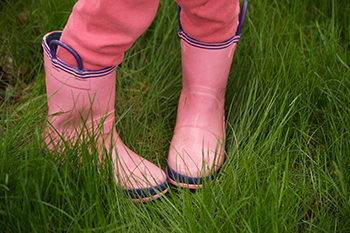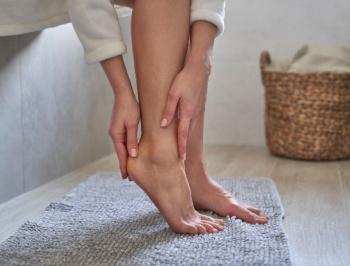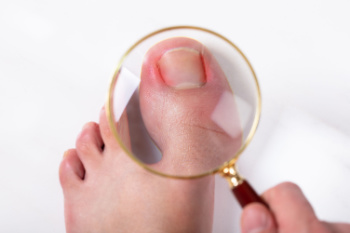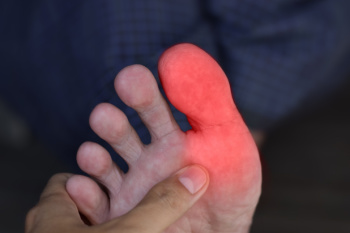Items filtered by date: October 2024
Causes of Intoeing in Infancy and Childhood

Intoeing, commonly referred to as pigeon toes, is a condition where a child's feet point inward when walking or standing. This alignment issue is often noticeable during infancy and can persist into later childhood. Factors that contribute to intoeing, include genetic predisposition and the natural development of the musculoskeletal system. In infants, intoeing may result from the position in the womb, as tight spaces can affect foot positioning. As children grow, it can be linked to conditions such as femoral anteversion, where the thigh bone is rotated inward, or tibial torsion, where the shinbone twists. While intoeing often improves as children grow, persistent cases may require evaluation by a podiatrist. If your child has this condition, it is strongly suggested that you are under the care of a podiatrist who can effectively monitor intoeing.
The health of a child’s feet is vital to their overall well-being. If you have any questions regarding foot health, contact one of our podiatrists of Nashville Family Foot Care. Our practitioners can provide the care you need to keep you pain-free and on your feet.
Tips for Keeping Children's Feet Healthy
- Make sure their shoes fit properly
- Look for any signs of in-toeing or out-toeing
- Check to see if they have Clubfoot (condition that affects your child’s foot and ankle, twisting the heel and toes inward) which is one of the most common nonmajor birth defects.
- Lightly cover your baby’s feet (Tight covers may keep your baby from moving their feet freely, and could prevent normal development)
- Allow your toddler to go shoeless (Shoes can be restricting for a young child’s foot)
- Cut toenails straight across to avoid ingrown toenails
- Keep your child’s foot clean and dry
- Cover cuts and scrapes. Wash any scratches with soap and water and cover them with a bandage until they’ve healed.
If you have any questions, please feel free to contact our office located in Nashville, TN . We offer the newest diagnostic and treatment technologies for all your foot care needs.
Tips for Improving Your Balance

Improving balance is an important way to reduce the risk of falls, especially as people age. Foot-related issues such as nerve damage, weakened muscles, and joint problems can disrupt balance and increase the risk of injury. Exercises that focus on foot strength and flexibility are helpful in maintaining stability. Finding supportive footwear that fits well can also make a significant difference by providing a stable base. A podiatrist can assess any medical conditions that affect your feet, such as fallen arches or neuropathy. Custom orthotics, certain exercises, or assistive devices can help to improve your balance. Scheduling regular foot check-ups is a good way to detect early signs of issues that might contribute to instability. Making small changes, such as decluttering walkways and ensuring adequate lighting, can reduce hazards at home. If you have fallen and have injured your foot or ankle, or at risk for falling, it is suggested that you schedule an appointment with a podiatrist for an exam and treatment options.
Preventing falls among the elderly is very important. If you are older and have fallen or fear that you are prone to falling, consult with one of our podiatrists from Nashville Family Foot Care. Our practitioners will assess your condition and provide you with quality advice and care.
Every 11 seconds, an elderly American is being treated in an emergency room for a fall related injury. Falls are the leading cause of head and hip injuries for those 65 and older. Due to decreases in strength, balance, senses, and lack of awareness, elderly persons are very susceptible to falling. Thankfully, there are a number of things older persons can do to prevent falls.
How to Prevent Falls
Some effective methods that older persons can do to prevent falls include:
- Enrolling in strength and balance exercise program to increase balance and strength
- Periodically having your sight and hearing checked
- Discuss any medications you have with a doctor to see if it increases the risk of falling
- Clearing the house of falling hazards and installing devices like grab bars and railings
- Utilizing a walker or cane
- Wearing shoes that provide good support and cushioning
- Talking to family members about falling and increasing awareness
Falling can be a traumatic and embarrassing experience for elderly persons; this can make them less willing to leave the house, and less willing to talk to someone about their fears of falling. Doing such things, however, will increase the likelihood of tripping or losing one’s balance. Knowing the causes of falling and how to prevent them is the best way to mitigate the risk of serious injury.
If you have any questions, please feel free to contact our office located in Nashville, TN . We offer the newest diagnostic and treatment technologies for all your foot care needs.
Gout Pain Can Be Managed
Everyday Foot Care Routine for Healthy Feet and Toenails

Maintaining a consistent foot care routine is vital for overall foot health and can prevent common issues such as infections and discomfort. Start by washing your feet daily with mild soap and warm water, including between the toes. After washing, dry your feet thoroughly to prevent moisture buildup. Regularly moisturize the skin, focusing on the heels and any dry areas, but avoid the spaces between the toes to prevent fungal growth. Check your toenails frequently, trimming them straight across to avoid ingrown nails. Wearing breathable shoes and changing socks daily can also help keep feet dry and healthy. Lastly, consider giving your feet a break with gentle stretches and massages to improve circulation. If you have developed foot conditions from lack of practicing a regular foot care routine, it is suggested that you contact a podiatrist who can treat various foot ailments and advise you on a foot care routine that is right for you.
Everyday foot care is very important to prevent infection and other foot ailments. If you need your feet checked, contact one of our podiatrists from Nashville Family Foot Care. Our practitioners can provide the care you need to keep you pain-free and on your feet.
Everyday Foot Care
Often, people take care of their bodies, face and hair more so than they do for their feet. But the feet are a very important aspect of our bodies, and one that we should pay more attention to. Without our feet, we would not be able to perform most daily tasks.
It is best to check your feet regularly to make sure there are no new bruises or cuts that you may not have noticed before. For dry feet, moisturizer can easily be a remedy and can be applied as often as necessary to the affected areas. Wearing shoes that fit well can also help you maintain good foot health, as well as making it easier to walk and do daily activities without the stress or pain of ill-fitting shoes, high heels, or even flip flops. Wearing clean socks with closed shoes is important to ensure that sweat and bacteria do not accumulate within the shoe. Clean socks help to prevent Athlete’s foot, fungi problems, bad odors, and can absorb sweat.
If you have any questions please feel free to contact our office located in Nashville, TN . We offer the newest diagnostic and treatment technologies for all your foot and ankle needs.
Bothersome Ingrown Toenails

Ever had that annoying pain in your toe and wondered what was going on? You might be dealing with an ingrown toenail. This happens when the edges of your toenail start growing into the surrounding skin, causing pain, swelling, and even an infection. Ingrown toenails often occur on the big toe and can be triggered in several ways. One common cause is cutting your toenails too short. When you trim too close, the skin can fold over the nail, making it grow inward. Rounded or torn nails are also prone to becoming ingrown, since they do not grow back with clear corners. Wearing shoes that are too tight or too short can push the skin over the nail. Injuries or repetitive activities, like soccer kicks, can worsen the issue. Keep an eye out for pain, swelling, and redness surrounding the toenail. If your toe is causing you trouble and you suspect an ingrown toenail, it is suggested you schedule an appointment with a podiatrist.
Ingrown toenails may initially present themselves as a minor discomfort, but they may progress into an infection in the skin without proper treatment. For more information about ingrown toenails, contact one of our podiatrists of Nashville Family Foot Care. Our practitioners can provide the care you need to keep you pain-free and on your feet.
Ingrown Toenails
Ingrown toenails are caused when the corner or side of a toenail grows into the soft flesh surrounding it. They often result in redness, swelling, pain, and in some cases, infection. This condition typically affects the big toe and may recur if it is not treated properly.
Causes
- Improper toenail trimming
- Genetics
- Improper shoe fitting
- Injury from pedicures or nail picking
- Abnormal gait
- Poor hygiene
You are more likely to develop an ingrown toenail if you are obese, have diabetes, arthritis, or have any fungal infection in your nails. Additionally, people who have foot or toe deformities are at a higher risk of developing an ingrown toenail.
Symptoms
Some symptoms of ingrown toenails are redness, swelling, and pain. In rare cases, there may be a yellowish drainage coming from the nail.
Treatment
Ignoring an ingrown toenail can have serious complications. Infections of the nail border can progress to a deeper soft-tissue infection, which can then turn into a bone infection. You should always speak with your podiatrist if you suspect you have an ingrown toenail, especially if you have diabetes or poor circulation.
If you have any questions, please feel free to contact our office located in Nashville, TN . We offer the newest diagnostic and treatment technologies for all your foot care needs.
What Are Hallux Valgus and Hallux Rigidus?

Hallux valgus and hallux rigidus are two different conditions affecting the big toe. Hallux valgus, commonly known as a bunion, is a deformity where the big toe deviates outward, causing the joint to protrude. It often results from wearing improper footwear, genetics, or arthritis, leading to pain, swelling, and difficulty wearing shoes. Hallux rigidus is a form of arthritis where the joint at the base of the big toe stiffens, limiting movement. Unlike hallux valgus, which involves deformity, hallux rigidus focuses on joint stiffness and decreased mobility. In terms of pain, both conditions can be quite painful, but hallux rigidus may be more limiting due to the loss of motion. Surgery may be required for either condition if conservative treatments do not provide relief or if the pain severely impacts daily activities. If you have pain in your big toe, it is suggested that you consult a podiatrist for a diagnosis and treatment that is deemed right for you.
Arthritis can be a difficult condition to live with. If you are seeking treatment, contact one of our podiatrists from Nashville Family Foot Care. Our practitioners can provide the care you need to keep you pain-free and on your feet.
Arthritic Foot Care
Arthritis is a term that is commonly used to describe joint pain. The condition itself can occur to anyone of any age, race, or gender, and there are over 100 types of it. Nevertheless, arthritis is more commonly found in women compared to men, and it is also more prevalent in those who are overweight. The causes of arthritis vary depending on which type of arthritis you have. Osteoarthritis for example, is often caused by injury, while rheumatoid arthritis is caused by a misdirected immune system.
Symptoms
- Swelling
- Pain
- Stiffness
- Decreased Range of Motion
Arthritic symptoms range in severity, and they may come and go. Some symptoms stay the same for several years but could potentially get worse with time. Severe cases of arthritis can prevent its sufferers from performing daily activities and make walking difficult.
Risk Factors
- Occupation – Occupations requiring repetitive knee movements have been linked to osteoarthritis
- Obesity – Excess weight can contribute to osteoarthritis development
- Infection – Microbial agents can infect the joints and trigger arthritis
- Joint Injuries – Damage to joints may lead to osteoarthritis
- Age – Risk increases with age
- Gender –Most types are more common in women
- Genetics – Arthritis can be hereditary
If you suspect your arthritis is affecting your feet, it is crucial that you see a podiatrist immediately. Your doctor will be able to address your specific case and help you decide which treatment method is best for you.
If you have any questions, please feel free to contact our office located in Nashville, TN . We offer the newest diagnostic and treatment technologies for all your foot care needs.

